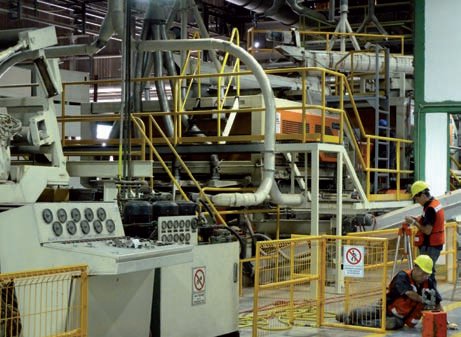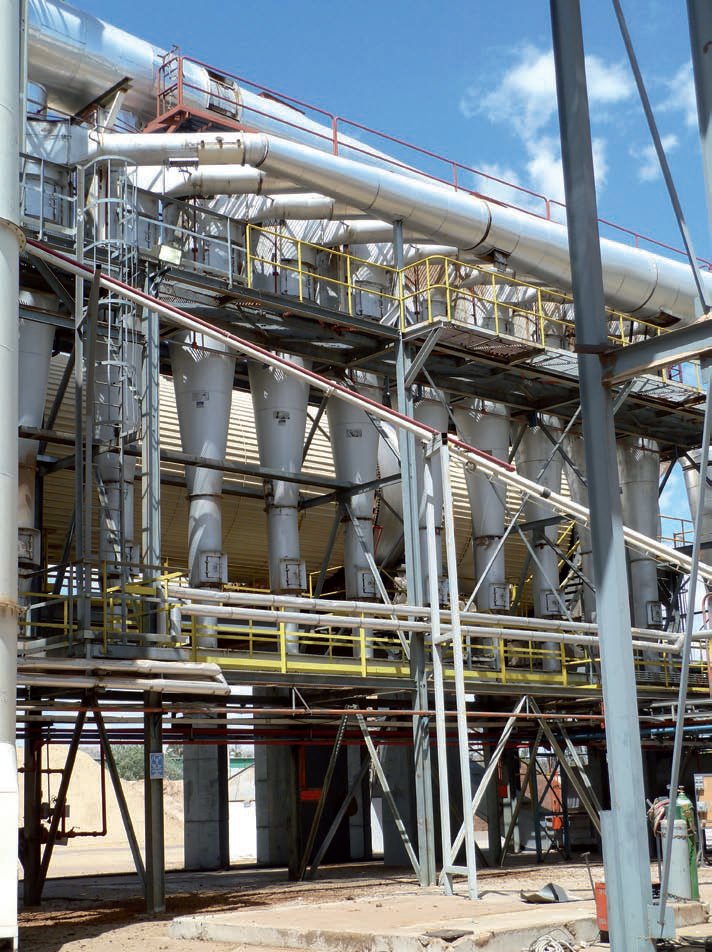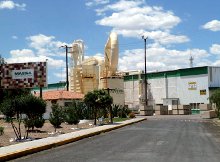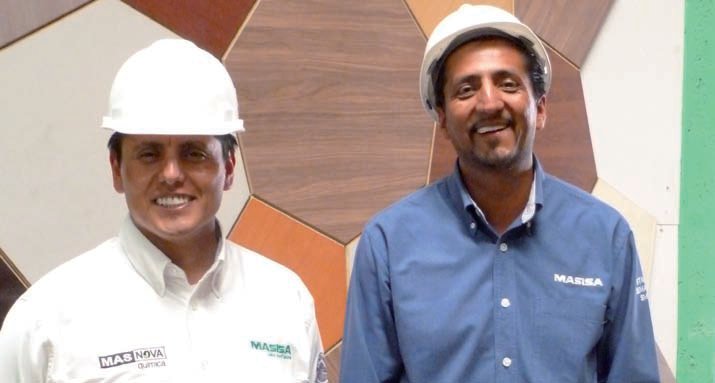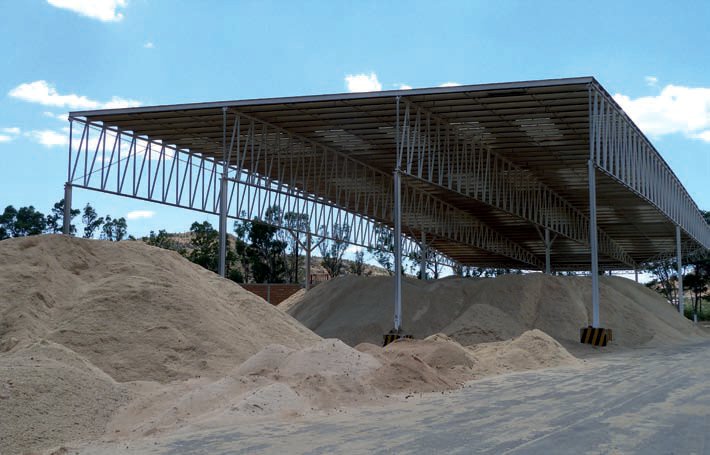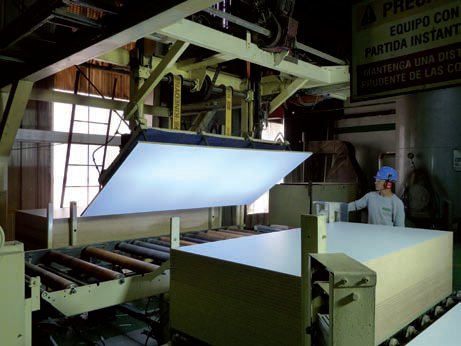Masisa sparks MDF rush
17 November 2014It has taken a major Chilean wood panel manufacturer to finally kick-start world-scale MDF production in the potentially huge, still largely unexploited, fibreboard market in Mexico. Richard Higgs visited Masisa México.
The initial announcement by Masisa group last year that it planned to create a new panel complex, including a 200,000m3/year fibreboard line, in central Mexico, released a string of new national MDF projects.
After years of dependency on MDF imports, chiefly from South America and the US, Mexican consumers will be spoilt for choice from 2016 with three new panel mills, each with around the same capacity.
Masisa's initiative was followed within days by two more MDF projects for similarsized lines from the northern Mexico plywood and particleboard producer Duraplay de Parral, and from Proteak, an industry newcomer which plans a 280,000m3/year eucalyptus-fed line more than 1,000km south in Tabasco state.
"It is a coincidence up to a point, but not so if you analyse the market in Mexico," said Masisa México's chief executive, Leo Schlesinger.
"From a market perspective, even if you didn't know that another company was going to announce [a project].....and didn't know you would have three plants coming on at the same time, it made complete sense to do it," said Mr Schlesinger.
What is clear is that for the Santiagobased group, already Mexico's largest wood panel producer and one of Latin America's top panel manufacturers, the growing Mexican market has long been viewed as a prime target. An MDF line is just the latest in a string of significant capital growth projects which Masisa has launched in the country.
From a small, two line, batch particleboard mill in Durango, acquired in 2002 from the Canadian forest products group MacMillan Bloedel, the Chilean group has expanded its operations rapidly since 2010. In that year, Masisa México invested about US$5m to install a new 40,000m3/year melamine low pressure laminating line - its third - and a second overlay paper impregnation line at the Durango plant.
Two years later, the group sank US$8.8m into an integration deal, acquiring the Mexican resin production assets of the Canadian bonding and surfacing materials group Arclin Inc. Masisa formed an offshoot, Masnova Química SA de CV to run its national chemicals business.
Then, last year, Masisa consolidated its position in Mexico with a US$54.5m acquisition of a leading national panel maker, Rexcel, adding three more plants and 460,000m3/year of particleboard capacity.
Apart from raising Masisa México's panel output to over 600,000m3/year, the deal gave it a second resin plant, along with melamine and decorative high-pressure laminating capability.
"We acquired Arclin as it was an opportunity to integrate into resin and have control of our key raw materials. Then we acquired Rexcel, which now provides us with a production footprint in Mexico which is extremely competitive," explained the chief executive.
Even before this major expansion programme, Masisa México was determined to improve and streamline its single panel plant in Durango. From 2007, when Mr Schlesinger took over the helm, the company began restructuring its operations.
"What we decided to do was focus on value added [products]. We focused on efficiency and realised we had some opportunities to make our plant more effective," he told WBPI. This meant investing in people, as well as improving the plant's energy efficiency and resin consumption.
Apart from expanding board finishing, through investing in low-pressure laminating and impregnation processes, Masisa planned to focus on product design.
"We decided to invest very heavily in design. Now we have the largest community of designers in the country. Just on 'Facebook', we have over 215,000 followers.
"We work with universities, with designers and with architects in specification projects to make sure our value-added products go to market in the best possible way," explained Masisa México's energetic ceo.
The Mexican subsidiary has also taken advantage of Masisa group's 'Placacentro' distribution network of outlets, now familiar across Latin America, to grow its market share in the country. Today, it has 84 of the stores, which also stock other materials and specified products.
MDF is not a new product in Masisa México's portfolio - it has imported MDF from its plants in Chile and elsewhere for some time. Masisa's import volumes vary annually, but account for around 120,000m3 per year, according to the firm.
However, plans to launch its own worldscale fibreboard plant in Mexico have been on Masisa's agenda for years and a Masisa México blueprint for such a scheme has been on the cards since before the global recession.
"This is a project we've been working on for over four years - both personally and as a company, so, it's not new. It's something we knew we had to do and something that makes complete sense to the Mexican market," said Leo Schlesinger.
Plans for the scheme slowed in the face of a national economic and market crisis since 2012 but last year, the horizon looked brighter, according to Masisa. "We saw the perspective for Mexico improving and we committed to the project," recalled the executive.
With four Mexican production sites already operating, what led Masisa to select Durango for its new MDF plant?
"This was the obvious choice from logistics and operational points of view," said Mr Schlesinger. Aside from synergies to be gained from the site's Masnova Química chemical plant, Durango also makes sense because of its warehousing and distribution capabilities, he told WBPI.
Masisa is investing up to US$135m in its latest project, which will see the creation of a major panel production complex through the addition of a Dieffenbacher-supplied 220,000m3/year MDF line, a new 100,000m3/ year low-pressure laminating line and the expansion of the existing Masnova chemical plant.
In June, Masisa was completing financing arrangements and had begun work on the project, hiring engineers and construction contractors. The process of obtaining essential environmental permits from the authorities for the scheme was complete, though this took longer than planned, admitted Mr Schlesinger.
At the Durango plant, a 20,000m2 site was pegged out for the MDF plant, though in June, when WBPI visited the site, disused buildings at the plant were still to be demolished ready for construction to begin.
Masisa hopes to take delivery of the first equipment in February 2015 and the MDF line start-up is scheduled for May 2016. Masisa México is keen to start it before that date, but Mr Schlesinger admits that talk of a 2015 launch is now "pretty ambitious".
At the heart of the Masisa México MDF plant is the Dieffenbacher continuous press line, with a nominal capacity of 220,000m3 per year. Also included are an Andritz refiner, while Steinemann will provide the sanding line. Board finishing will play a major part in the MDF project, with its additional 100,000m3 per year low-pressure lamination line supplied by Wemhöner. The new melamine line is due to start operating in early 2016.
Masisa's line will include a cut-to-size section and it plans to offer a variety of MDF surfaces, including melamine and veneers, though Mexico's consumption of laminated panels is still very low.
Earlier in the year when he spoke to WBPI, the Masisa ceo was reluctant to divulge more details of its MDF line, its ramp-up plan and just how much of its output will be surfaced when the plant goes on stream, not least because of the increasingly competitive nature of Mexico's domestic market.
"We will finish as much of our board as possible, but there's plenty of work to be done in the market before that happens," conceded Mr Schlesinger. He stressed that the percentage of laminated MDF in Mexico is still very low. Masisa México currently has overall laminating capacity of almost 340,000m3/year.
The company is already following Masisa's group-wide sustainability policy by manufacturing panels with the lowest possible resin emissions. It has lowered emission levels to E1 at the particleboard plants it acquired from Rexcel and also complies with the CARB regulations for board exported to the US.
"We are one of the only companies which works with very low emissions of formaldehyde in our resins. It is the best way to be for a principled company that values safety and wellbeing first.
"Cost-wise, it's always a competitive disadvantage and can have a very significant impact on your competitiveness," conceded Mr Schlesinger.
Masisa México already has a built-in cost advantage over its competitors, thanks to its in-house resin supplier Masnova. The former Arclin chemical plant is capable of producing 60,000 tonnes/year of resin and 7,300 tonnes/ year of formaldehyde, in addition to the 24,000 tonnes/year resin capacity at the Rexcel chemical plant in Lerma, near Mexico City.
Today, Masnova, which also sells its output to third party customers, is Mexico's biggest resin manufacturer, with a domestic market share of more than 54%.
Expansion of formaldehyde capacity at the Durango chemical plant is included in Masisa's MDF project, but Masisa also views Masnova as a promising future business in its own right, thanks to the Mexican government's recent radical energy sector reform.
"We have plenty of [resin] capacity and we're investing more to grow the chemical business in Mexico, too. The reforms in Mexico's energy market, which will change restrictions on secondary petrochemicals, also open up more opportunities for Masnova which go beyond our industry," explained Mr Schlesinger.
More than a year after it acquired the Rexcel operations, Masisa has been busy upgrading and integrating its particleboard plants in Chihuahua city in the north and at Zitacuaro, west of Mexico City, together with the board finishing and chemicals site in Lerma.
Masisa has invested around US$15m in a major capital expenditure programme "to get the plants up to speed", primarily improving safety, including the culture of its employees: "Quality and efficiency", according to Mr Schlesinger. Last year, spending was focused on the Zitacuaro and Chihuahua units.
Masisa's Durango panel plant is based on two single-opening-press particleboard lines with a combined capacity of 155,000m3 per year. The first unit is from Dieffenbacher and the second a Siempelkamp line, sharing one Classiformer dryer between them. The plant has total melamine laminating capacity of 108,000m3 per year from three lines and two impregnation lines, along with a single, modified Bison/Binos sanding line.
The particleboard plant has two thermal energy plants since the installation of an Indian-supplied Thermax unit in 2010. This was added to the existing KMW3.78gcals/ hour unit at the site.
The Durango plant currently relies totally on recycled sawmill pine wood chips, shavings and fines brought by road from up to 100km away. But Masisa México is spearheading a project aimed in the long term at substituting Mexico's traditional reliance on native forestry with a sustainable plantation resource.
Three years ago, the Chilean firm launched a plantation programme up to 20km from the plant, using third party landowners to put in pine seedlings on over 380ha. The scheme, one of Mexico's most successful attempts to stimulate a new national forest base to date, has a plantation target of 10,000ha by 2018.
Mexico's lack of sufficient quality wood fibre over many years has been a major obstacle to the national panel industry developing viable MDF production and a vibrant fibreboard market in the country.
This left it trailing other nations in the region, such as Chile, Brazil and Argentina, where MDF manufacture has expanded rapidly from a firm, sustainable planted forest base.
However, there is fresh hope that the Masisa planting initiative, along with growing demand from a new MDF manufacturing segment, will lead to major forestry reform and the creation of a sustainable fibre resource in Mexico before long.
